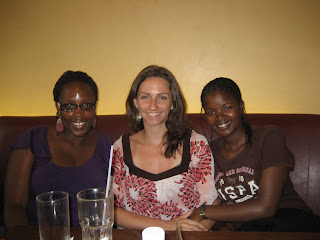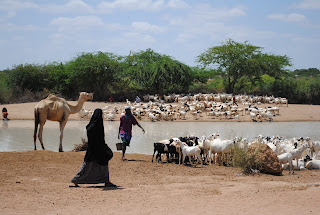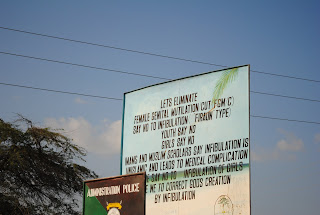Beirut really is as exciting as I've heard, just like any European city you imagine, people are sitting in cafes late at night talking politics and chain smoking. One of the most remarkable things we've all noticed is how unbelievably friendly and helpful people are. Beyond just trying to help us learn a word or two of arabic, if you tell someone you're lost they'll walk you where you need to go, if you tell them you're looking for an apartment, they'll spend half the day wandering the streets with you trying to help negotiate a good deal.
One part that I love most so far, is walking down the street and hearing people use Arabic, French, and English interchangeably, which is where I got the title of this entry - it's something that the "youngins" sometimes say - Hi (English), Kifak (Arabic), ca va (French). There are definitely more English speakers than French speakers so far, which is a little bit of a bummer since I was hoping to brush up on my Francais...but Josh is trying to learn French so I get to review random vocabulary and phrases when they come up.
It was through the kindness of a total stranger than we found our awesome apartment. We met this guy the other day who, when you picture the stereotype of the classic Arab man: greased back hair, partially unbuttoned shirt with really hairy chest adorned with a thick silver chain, tight fashionable jeans, who introduced himself as an ex-pilot to make sure his manhood was reinforced, he fit it perfectly. [DISCLAIMER: i'm including this stereotype not in a judgmental way, with no ill will or offense meant - in the same way that I constantly get told how snobby and pretentious-sounding French people are. Stereotypes exist and this guy was physically representative of one, but as a person he was genuinely kind!]. He owns one of the food stands that we frequented in the first 2 days here, and when we told him we were looking for an apartment, he called some people and the next day took us to see the best deal for the money (by far) that we had come across. Beirut is almost comparable to LA in terms of the size of space you get for your money.
We ended up with a place on the top/8th floor of a building in a cute neighborhood called Hamra, within walking distance to the American University and all the nearby shops and restaurants and cafes. Best of all is the AMAZING ice cream place right at the foot of our building...yummy mango and pistachio and cheesecake... And there is a bustling Lebanese fast-food spot called Barbar Restaurant where you can get Manaeesh (kind of pita-like bread with Zaatar (thyme) or jebneh (a mild white cheese), zaatar with jebneh, and I've been getting it with cucumber, mint, and tomato...And it's less than $2. If you walk down a few blocks toward the university it gets more expensive, but we're just on the edge of town where things are priced for the locals which is awesome for our shoestring budget.
Yesterday was our first day of work here. I forgot to bring my (short) white coat with me on this trip, so on our first day in Haifa Hospital in Burj Al-Barajneh camp (a Palestinian refugee camp in southern Beirut that has existed for over 60 years) I was loaned a (LONG) white coat. It's scary, people expect you know stuff when you wear a long coat, they call you doctor, they hold you to a much higher standard...Intern year is gonna be scary (but exciting!). There's much less hoop-jumping here compared to the camps in Kenya - we asked the hospital director about interviewing people about their experiences here and he said no-problem.
For clinical work, they asked that we all split up since the hospital doesn't get too busy, so that we don't overlap with the patients that are here. I've been in the OB/Gyn department the last 2 days, which has consisted mostly of prenatal visits. There are funny non-smoking signs throughout the hospital that have the classic picture of a cigarette with a red line through it, but the funny part is that next to the cigarette is a picture of a giant hookah water pipe thingy. Oh yeah, there's also a picture of a machine gun with a red line through it, just in case you wanted to come see the doctor with your automatic weapon.
Not only do the doctors chain smoke in between seeing each patient, but the nurse left her cigarette burning during one patient visit, she just set it off to the side of the desk. Remember - this is the prenatal visit office. I asked if patients can smoke in their room and i was told "Oh no. But they sometimes do." A pack of cigs here costs less than a dollar...it's pretty sad...at the end of the day, our hair and all our clothes reek of tobacco smoke. Right now i'm in one of the only non-smoking places in Beirut, upstairs in a cafe full of expats, but everyone is sitting outside and smoking, there are only 2 other people up here.
Today I got to assist on an urgent C-section in the hospital. Before going to scrub in, the female OB surgeon and I changed in to scrubs and walked in to the office area. She sprayed herself with perfume and saw me start to smile, at which point i'm assuming she should thought I wanted some and she walked over and sprayed me twice and asked - "you like?? it's Euphoria." Maybe it's me, but it just seemed a little odd right before you go scrub...
Throughout the case, the OR was full of quiet but anxious chants of "Bismillah" from the surgeons and nurses. I got to suction the floppy blue baby when they pulled it out of the uterus, and was pretty relieved when it pinked up and started screaming. As they were closing up the patient, the electricity went out. This happened the day before as well, so people just pause what they're doing and wait for the generators to kick in. Makes you wonder how stressful that could be if you were doing brain surgery.
So we'll see how these 3 weeks go. We're all going to be rotating through the emergency dept, internal med, and maybe pediatrics, as well as trying to set up interviews for our video project, and have some fun in the mean time. The internet companies here are owned by the government so they all charge a ridiculous fee - and they charge per MB or GB of usage, so it's too expensive and slow to try to upload any pictures yet... i'm working on a way to figure that out.













































